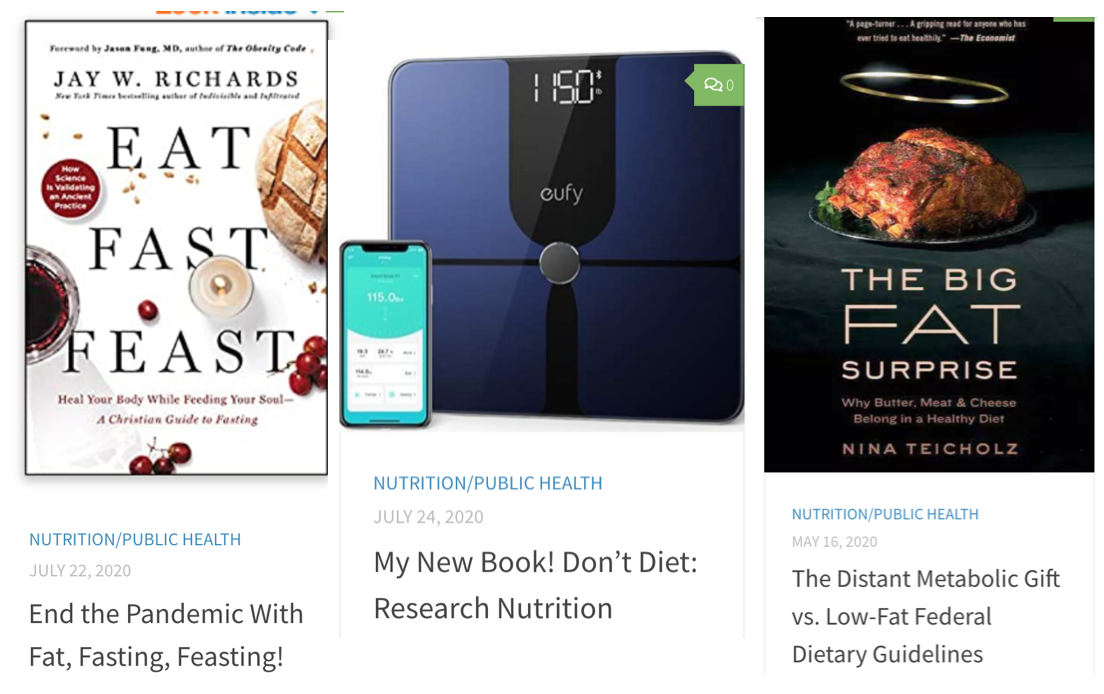Two Surprise Nutritional Journeys
My new book could be titled: Don’t Diet: Research Nutrition. Diet programs and fads attract millions wishing to lose weight, with billions spent on weight loss goods and services (see The $72 Billion Weight Loss & Diet Control Market). But what if just research and watching nutrition videos could be as effecting in shifting behavior, improving health, and losing weight? It was for me.
In May something strange started. Emotional turmoil at home and at work (plus living at work and working from home) led to skipping meals, exercising more, then to recasting my mindset on sweets and desserts. I had long been the guy who always ordered dessert and bought sugary cinnamon rolls. Suddenly I recast myself to be the guy who didn’t. Over the month of May I lost 20 pounds, then lost 20 more through the summer. That was in 2003.
Looking back, I always thought it was the emotional issues that led to me skipping meals and avoiding pastries. But over the next year my weight gradually returned. I didn’t think much about it at the time and felt healthy, played basketball regularly, and lifted weights. Before too long I was again enjoying cinnamon rolls and other pastries. I’m 6’2″ and over the decades my weight usually ranged between 214 and 224, except for those months in 2003 when it dropped to 195, even 190 for awhile.
Last May, in 2020, this dietary transformation began again. I’d gained some and weighed 232. Looking sideways in the mirror one early May morning, I looked more like my father who had gained weight and suffered for over a decade from Type 2 diabetes, and passed away in April.
Wondering if I was on my father’s path to Type 2, I decided to do some research. How would I know if I was on that path, on the road to diabetes? Plus the pandemic was in the news with obesity and diabetes being major contributors to severe and critical cases.
Researching, reading, watching medical conference presentations led me to lose twenty pounds through May 2020, then lose another twenty through summer and fall. I’ve weighted 190 now plus or minus a couple pounds since November. More important, my body fat percentage has dropped to healthhy levels and my visceral fat has dropped a lot (and waist size reduced from 40 inches to 36).
Also, 2020 research suggests my 2003 weight loss was more from New York Times and Wall Street Journal reports than from emotional trauma at work. I read in 2003 the growing popularity ofthe low-carb Atkins Diet. Some of these stories are still online, for example a 2003 Voice of America article, Atkins Diet Phenomenon May Force Changes in Food Industry — 2003–11–29:
…Of course, many Americans are doing something about the [being overweight], by dieting. At least 14 million of them have embraced the so-called “Atkins Diet,” while another 36 million have adopted slightly less rigorous versions of this high-protein, high-fat, and low-carbohydrate regimen.
I was one of those 36 million cutting carbs by eating more protein and fat.
Studies showing health improvements with Atkins Diet were widely reported in the newspapers and widely discussed. Here is 2003 report from one study:
All participants met with a registered dietitian at 0, 3, 6 and 12 months. Those in the Atkins group were given a copy of Dr. Atkins New Diet Revolution and asked to follow the diet as described. The conventional diet group was given instructional materials on a 1200–1500 calories/day (women) or 1500–1800 calories /day (men) diet that consisted of 60% carbohydrate 25% fat, and 15% protein based on the Food Guide Pyramid. Atkins participants lost an average of 14.7 pounds compared with 5.8 pounds in the conventional group at 3 months; 15.2 pounds versus 6.9 pounds at 6 months; and 9.5 versus 5.4 pounds at 12 months. At one year, Atkins participants had greater increases in HDL cholesterol (18% vs. 3%) and greater reductions in triglycerides (-28% vs. 1%) than did those following a conventional diet. Neither group showed changes in LDL (bad) cholesterol at one year.
One-Year Study of Atkins Diet Shows Surprising Results, Penn Researchers Report (May 21, 2003)
Also, I assumed my weight returned “naturally” as it does for so many after losing weight. But it was as much the news that changed. No more stories about millions losing weight and getting healthy with low-carb diets. Instead the stories were of “new studies” on the dangerous risks people were taking following “unproven” fad diets.
Dr. Atkins, age 72, slipped on an icy sidewalk, hit his head and died in April, 2003. Skeptics of his high-fat, low-carb diet piled on, obtaining his medical records illegally and publishing them in the Wall Street Journal. His weight at death was reported as 258 pounds (so at 6 feet tall, obese). Again, lots of cautionary newspaper articles about the overweight low-carb diet doctor. Yet it was later revealed Atkins actual weight was 195 and the extra was bloating from hospital treatment during his final days. For more see The Death of Dr. Atkins (Crossfit, July 3, 2020).
The Adkins Diet was opposed by the federal government nutritional establishment. Nina Teicholz, author of The Big Fat Surprise, in this presentation — Nina Teicholz — ‘The Real Food Politics’ — looks at the the deep institutional lock-in by federally-funded national health institutes, nonprofit foundations, food associations, and the food industry. The federal government’s low-fat Food Pyramid and Plate are not going down without a fight. (Nutrition Coalition is engaged in this fight.)
The public health establishment had been promoting low-fat Food Pyramid nutritional recommendations for decades but Americans kept gaining weight (though correlation or causation). “Big Carb” fought back by funding organizations and foundations sponsoring articles and studies. See Those Studies About Pasta Being Good For You? Some Are Paid For By Barilla (BuzzFeed News, April 19, 2018).
Before long the Atkins Diet “craze” was smothered by media reporting on claimed benefits of low-fat “Mediterranean diets” and the standard calories in/calories out theories of weight gain and loss. Millions of Americans like me returned to their old habits and gained back their lost pounds. Was the Atkins Diet dangerous? Was low-carb weight loss only temporary? Here is a chapter from The Big Fat Surprise on this nutritional history (free online). Excerpt:
As the low-carbohydrate, high-fat diet became popular, New Yorkers flocked to his Midtown office, and Atkins soon wrote other best-selling books based on his ideas of healthy nutrition. In 1989, he also launched a successful company that sold low-carbohydrate dietary supplements, including Atkins Bars, low-carb pasta, and low-carb, high-fat diet drinks, with millions of dollars in sales annually. Yet even after achieving both fame and fortune, Atkins, to his consternation, could never gain respect from his colleagues or the academic researchers influencing public health policy.
The rivalry between Atkins and Ornish: Low carb vs. high carb (DietDoctor, September 6, 2016)
For more see: How the Ideology of Low Fat Conquered America (Journal of the History of Medicine and Allied Sciences, Volume 63, Issue 2, April 2008). From Abstract:
After 1980, the low-fat approach became an overarching ideology, promoted by physicians, the federal government, the food industry, and the popular health media. Many Americans subscribed to the ideology of low fat, even though there was no clear evidence that it prevented heart disease or promoted weight loss. Ironically, in the same decades that the low-fat approach assumed ideological status, Americans in the aggregate were getting fatter, leading to what many called an obesity epidemic. Nevertheless, the low-fat ideology had such a hold on Americans that skeptics were dismissed. Only recently has evidence of a paradigm shift begun to surface, first with the challenge of the low-carbohydrate diet and then, with a more moderate approach, reflecting recent scientific knowledge about fats.
My May, 2020 journey started with some work and home turmoil and a few skipped meals. I just wasn’t hungry for while. And with the pandemic hitting America, and hitting obese and diabetic people hardest, I wondered if I was pre-diabetic, as my father likely was for a decade before being diagnosed with Type 2 diabetes. So I decided to do some research. Much like reading newspaper articles about low-carb diets in 2003, in 2020 I was watching online videos from Low Carb Down Under and CrossFit Health medical conferences, then listening to Diet Doctor and Low Carb MD podcasts. Again, I recommend this history of nutritional politics: Nina Teicholz — ‘The Real Food Politics’.

So my nutritional research journey continues. I’ve been posting research notes since mid-May: The Distant Metabolic Gift vs. Low-Fat Federal Dietary Guidelines (May, 2020), then End the Pandemic With Fat, Fasting, Feasting! (July, 2020), and My New Book! Don’t Diet: Research Nutrition (July, 2020), and From Poor Nutrition to Permanent Pandemics (December, 2020). Many more posts since.

And this nutrition/public health video, connecting nutrition public health policy to two student debate topics (basic needs and E.U. immigration): Nutrition, Basic Needs, Migration, take two.
Much more to learn. Knowledge and facts are directional, influencing our thinking and behavior. Best wishes for your nutritional research and journey!
